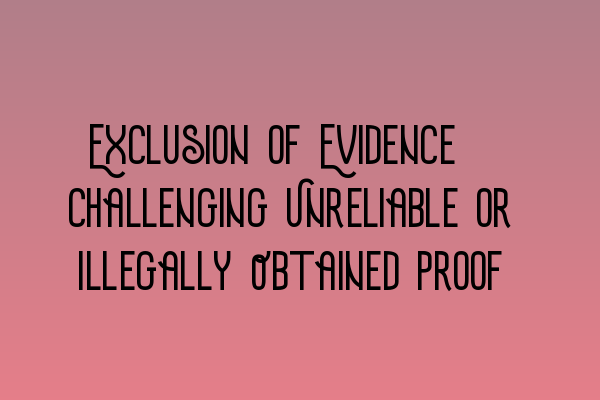Exclusion of Evidence: Challenging Unreliable or Illegally Obtained Proof
As criminal defense solicitors, one of our primary objectives is to safeguard the rights of our clients and ensure a fair trial. This often involves challenging the admissibility of evidence that may be unreliable or obtained unlawfully. In this blog post, we will discuss the concept of excluding evidence and the legal grounds for challenging its admissibility.
What is exclusion of evidence?
Exclusion of evidence refers to the process by which a court may refuse to admit certain types of evidence during trial. This can be done if the evidence is deemed to be unreliable or if its collection violated the defendant’s rights. The exclusion of evidence is a crucial mechanism in upholding the integrity and fairness of the criminal justice system.
Challenging unreliable evidence
When dealing with unreliable evidence, it is essential to demonstrate to the court that the evidence is likely to be inaccurate, misleading, or lacks probative value. This can be achieved through various means, such as:
- Cross-examination of witnesses: In order to cast doubt on the reliability of the evidence presented, vigorous cross-examination of the witnesses is necessary. This allows the defense to challenge inconsistencies, biases, or motives that may affect the credibility of the evidence.
- Expert testimony: In complex cases where scientific or technical evidence is involved, expert witnesses can be called upon to challenge or refute the reliability of such evidence. Their specialized knowledge and expertise can undermine the prosecution’s case and strengthen the defense’s argument for excluding the evidence.
- Evidentiary rules and precedents: The defense can argue that the evidence in question fails to meet the requirements set out in the relevant evidentiary rules or that it does not meet the standards established by previous court decisions. By highlighting these legal principles, the defense can weaken the prosecution’s case and increase the chances of the evidence being excluded.
It’s crucial to note that the burden of proof lies with the defense to establish the unreliability of the evidence. Therefore, a comprehensive examination of the evidence and a clear presentation of persuasive arguments are essential.
Challenging illegally obtained evidence
In certain circumstances, evidence may have been obtained unlawfully, violating the defendant’s rights as protected by the law. When facing illegally obtained evidence, the defense can seek its exclusion by invoking legal principles such as:
- Unlawful search and seizure: If the evidence in question was obtained through an unlawful search and seizure conducted by law enforcement authorities, the defense can challenge its admissibility. The Fourth Amendment of the Constitution protects individuals from unreasonable searches and seizures, and any evidence collected in violation of this right may be excluded.
- Coercion or duress: If the evidence was obtained through coercive or duress-inducing measures, such as threats, intimidation, or physical force, the defense can argue for its exclusion. The principles of fairness and justice demand that evidence collected through such means should not be admitted in court.
- Violation of Miranda rights: If the defendant’s Miranda rights, which include the right to remain silent and the right to counsel, were infringed during the collection of evidence, the defense can seek its exclusion. Any statements or evidence derived from a Miranda rights violation may be considered involuntary and therefore unreliable.
By challenging illegally obtained evidence, the defense aims to protect the defendant’s constitutional rights and maintain the integrity of the criminal justice system.
For further practice and preparation for your SQE exams, consider our SQE 1 Practice Exam Questions or take advantage of our SQE 1 Practice Mocks FLK1 FLK2 to assess your knowledge and skills. Additionally, our SQE 2 Preparation Courses and SQE 1 Preparation Courses are designed to equip you with the necessary tools and knowledge for success in your exams. Stay updated with the latest SRA SQE Exam Dates for optimal planning.
In conclusion, challenging the exclusion of evidence is a fundamental part of criminal defense work. By effectively navigating the legal framework, presenting compelling arguments, and leveraging expert testimony, solicitors can increase the chances of unreliable or illegally obtained evidence being excluded from trial. This ensures a fair and just process for defendants and upholds the principles of the criminal justice system.
